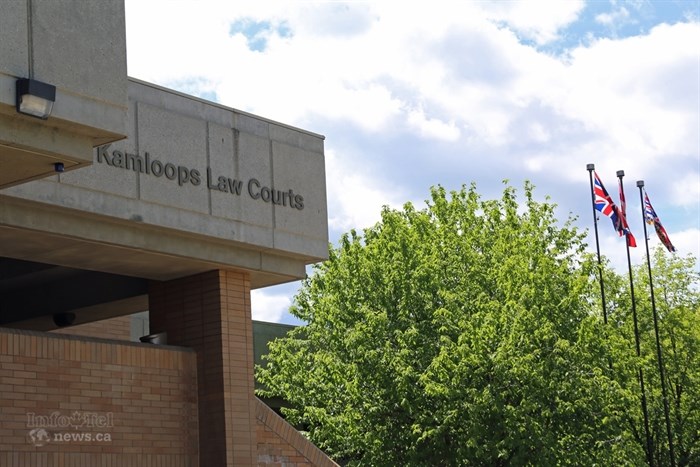
(JENNIFER STAHN / iNFOnews.ca)
August 26, 2015 - 8:00 PM
'SURELY BEFORE YOU GOT ACROSS THE THRESHOLD OF THE COURTROOM, THE POLICE COULD HAVE FIGURED OUT THESE THINGS': JUDGE
KAMLOOPS — If a person gives a false name to police, is it up to the police, the Crown or the accused to prove who the person really is?
It's a case lawyers are calling 'unique' in Kamloops Supreme Court after a homeless man's fake identity was entered into the RCMP database before the man was charged, convicted and sentenced as a person who never existed before 2013.
Eric Bradley Charlie, 31, is in custody while he faces charges of obstructing justice and for using a false name. Yesterday, Aug. 25, was his first day of trial.
In 2013, Const. Peter Froyland stopped Charlie during a street check. When the officer asked the homeless man for his name, he told him he was James Rocky Whitford, born on August 15.
That information was entered into the RCMP database and was accessed after Charlie, under Whitford, committed a series of crimes. The identity carried on through several branches of justice from RCMP to court to corrections.
'IT WAS A RUSE PULLING THE WOOL OVER THE EYES OF THE JUSTICE SYSTEM': CROWN
Crown prosecutor Frank Caputo says Charlie intended to create a new identity to escape his lengthy criminal record. Having no record can often mitigate sentences after conviction, which is what Caputo says happened when Charlie continued committing crimes under his new name.
“Mr. Charlie has been through the system for a number of years - far too many years. And then all of sudden he becomes James Rocky Whitford and the sentences are dramatically different. He is treated as someone without a criminal record,” Caputo said.
Crown argued Charlie's first obstruction of justice was when he lied to police about who he was and stayed with the identity throughout court proceedings.
“The accused found an identity that nobody knew about. He was prepared to permit counsel to mislead the court,” he said. “The system not only demands that people give us their name, it requires it. His obstruction of justice continued on and on and on until it was discovered that it was a ruse pulling the wool over the eyes of the justice system.”
Caputo said Charlie's obstruction of justice continued through his court proceedings when he answered to the court under Whitford and signed off on paperwork as him, but McEwan disagreed.
“In terms of your concern about what happened as far as the administration of justice is concerned, he always showed up. His giving a false name did not keep him out of custody,” McEwan said. “The only relevance that I discern is that he probably got a lighter sentence from the Crown’s perspective. Surely before you got across the threshold of the courtroom, the police could have figured out these things."
'THERE IS NO LAW THAT I CAN IDENTIFY THAT SUGGESTS A PERSON HAS A RESPONSIBILITY TO PROVIDE A NAME': DEFENCE
Charlie’s lawyer, Ken Walker sees the case differently.
“A person can be arrested without providing a name. There are consequences to that. They can be (held) in custody,” Walker said. “There is no law that I can identify that suggests a person has a responsibility to provide a name. The responsibility under arrest is to provide specific identification."
Walker noted that when his client first told RCMP he name was Whitford, he wasn't committing a crime. Justice Mark McEwan agreed.
“It’s not a form of perjury to lie to a police officer when he had no right to ask you a question to begin with. (The law applies) if the police have a lawful reason to suspect this person committed an unlawful offence, but they’re not in the execution. They’re simply talking to a guy on the street,” he said.
Walker noted his client wasn’t using the name only for court, but rather appropriated the name for himself, identified with it and had a Facebook page under the name Whitford. He added Charlie was not trying to pin the case on someone else by giving a different person's name.
“This case is really quite unique. It’s not that the Crown can say he’s using a false name. The admissions say he used this name for a period of time,” Walker said. "He appeared before the court as is required to be done. He acknowledged that he was the person to which this occurred and he did the events that occurred."
Walker said under arrest, an accused person must provide their photograph and fingerprints, which Charlie did. Each set of fingerprints scanned into the RCMP database is given an identification number. Walker said the computer, after scanning Whitford’s prints, was able to connect it to Charlie’s and attach the same identifier to it. But that information never came out in Whitford’s previous cases.
“This could have all been corrected before the very first sentence if the Crown or police had sent the fingerprints in,” Walker said.
Caputo argued policework wasn't part of the case.
“The Crown does not have to prove that the police should have done a better job,” he said.
The case is pending a decision from Justice McEwan.
This is the second time court has heard this case after a judge dismissed a Crown's appeal to re-sentence Charlie for the offences he committed and served time for under Whitford.
To contact a reporter for this story, email Glynn Brothen at gbrothen@infonews.ca, or call 250-319-7494. To contact the editor, email mjones@infonews.ca or call 250-718-2724.
News from © iNFOnews, 2015